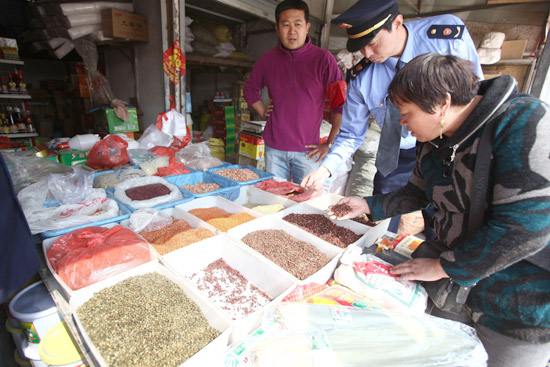Five-year ban for additive abuse
Beijing's health authority is set to launch a crackdown against the illegal use of additives in a bid to further protect food safety.
 |
|
An inspector from the industry and commerce authority in Beijing checks for dyed Sichuan peppers at a local market on April 28. |
According to the Beijing health bureau, the campaign will require restaurants to monitor their compliance with regulations and include regular inspections and random checks by food safety authorities.
The bureau also said business owners found using illegal additives or overusing legal ones will be banned from running catering companies for five years. Business owners found to have intentionally used inedible ingredients will lose their food service licenses and face punishments through the legal system.
Official figures show 2,314 additives are in regular use in the food processing industry in China.
"Additives are under the spotlight these days," said Cai Changjing, a press officer with the Beijing health inspection office. "The health authority will oversee catering businesses to ensure they do not misunderstand what is legal and illegal when it comes to additives."
The campaign will begin in June and last until the end of the year, he said.
Health inspectors will pay special attention to the use of additives in hot pot soups, beverages and condiments.
The spending patterns of catering businesses will also be monitored by the health authorities and disease control and prevention centers to see how many additives they buy.
"Health bureaus in every district and county will make records of what additives local restaurants buy and who they buy them from," Cai said. "Purchase invoices will be photocopied and put on record."
Food safety experts welcomed the campaign and said most food safety scandals in China are down to additives.
"Both the tainted milk scandal in 2008 and incidents such as the dyed steamed buns found recently in Shanghai were caused by additives," said Sang Liwei, a food-safety lawyer and Global Food Safety Forum representative for China.
Experts said more education about food safety should also be given to the owners of restaurants and food processing companies.
"They should know what legal consequences they will face if they risk adding any illegal substance and how severely people's health can be harmed by illegal additives," Sang said.
Experts have also called for the scrutiny to continue after the short-term crackdown is over.
 0
0 






